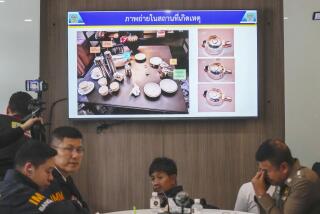Tylenol Death Called Isolated : But Stores in 34 States Pull Bottles Off Shelves
- Share via
WHITE PLAINS, N.Y. — The death of a woman who took cyanide capsules from a bottle of Extra-Strength Tylenol probably was an isolated incident, officials said Tuesday, but thousands of stores in at least 34 states pulled the popular pain-killer off the shelves as a safety precaution.
Officials said evidence so far suggests that the deadly cyanide capsules were placed in the tamper-resistant Tylenol bottle within the last 10 days, and not when the drug was manufactured last May.
“To date, we have not found any additional capsules contaminated with anything,” Dr. Anita Curran, Westchester County health commissioner, said.
“We are looking at it as an isolated case because we have no evidence it’s anything else,” said Deputy Police Chief Owen McClain of Yonkers, a city of 191,000 north of Manhattan, where the investigation is focused.
McClain said a 15-member police task force was investigating the death of Diane Elsroth, a 23-year-old stenographer from Peekskill, N.Y., at her boyfriend’s house in Yonkers last Saturday. He said the death was considered a homicide.
The case initially appeared to be an eerie echo of the 1982 deaths of seven Chicago-area residents who ingested cyanide-laced Tylenol. No one was ever charged, and the case officially remains open. An FBI spokesman in Chicago said there was no evidence to indicate any link between the New York death and those in 1982.
Westchester County Executive Andrew P. O’Rourke told a news conference here that Elsroth’s boyfriend, identified as Michael Notarnicola, told police he “opened a brand new, apparently unopened bottle of Extra-Strength Tylenol” and gave her two capsules shortly after midnight Friday. She was found dead in bed 12 hours later.
No Suspects in Case
McClain said that Notarnicola and his family were considered “witnesses” in the homicide case. “We do not have any suspects,” he said.
O’Rourke said Notarnicola’s mother took a Tylenol capsule from the same bottle after the body was found but suffered no ill effects. No one answered telephone calls to the Notarnicola home Tuesday.
County Medical Examiner Millard Hyland said an autopsy found that Elsroth had died of “acute cyanide poisoning,” with large quantities of cyanide in her blood and stomach.
Tests showed that the white crystalline Tylenol compound had been replaced in three of the remaining 21 capsules with a brown mixture containing 60% potassium cyanide and various inert materials, he said.
Huge Dose of Cyanide
The tainted capsules appeared the same as normal Tylenol. But Hyland said that each red-and-white 450-milligram capsule contained more than six times the cyanide needed to kill an adult.
Hyland said that potassium cyanide, a powerful, fast-acting poison widely used in industrial and chemical processing, would be expected to eat through the gelatin capsules within 8 to 10 days and that, therefore, the poison presumably was placed in the bottles within the last 10 days.
McClain said the Tylenol had been purchased in the last week from an A&P; grocery in Bronxville, N.Y. He said the bottle, labeled lot number ADF-916 with an expiration date of May, 1987, did not match any of the other Tylenol packages on the store’s shelves.
“There is no reason to believe the victim was the target, but we have not ruled out the possibility,” McClain said.
Shipped ‘All Over the East’
Elsie Bohmer, a spokeswoman for McNeil Consumer Products Co., the division of Johnson & Johnson that makes Tylenol, said the lot number in question had been manufactured in May, 1985, in Fort Washington, Pa., and shipped to consumers “all over the East Coast” in August. “There have been no other incidents,” she said.
“We do believe what happened in Westchester is a local situation,” Johnson & Johnson Chairman James E. Burke told a news conference at corporate headquarters in New Brunswick, N.J. He said he is “confident” that the cyanide was not put in the bottle at a company plant.
Burke said that at least 95% of the bottles in the lot to which the tainted bottle belonged have been sold and that 50% to 60% of the 200,000 capsules probably have been consumed. The company has advised consumers not to use Tylenol capsules for the next several days.
The tainted Tylenol bottle and packaging have been sent to the FBI laboratories in Washington for additional testing. In an official statement, the FBI said the investigation “has produced no information to suggest that any other products were contaminated other than that allegedly involved in the death of Diane Elsroth.”
Triple Protection
William M. Grigg, a spokesman for the U.S. Food and Drug Administration, said that the Tylenol packaging exceeds federal requirements imposed since 1982. Tylenol uses three precautions: glued carton ends, a tight plastic seal around the bottle’s lid and a foil inner seal. A warning on each package tells consumers not to buy the product if any of the seals are broken.
Extra-Strength Tylenol, an acetominophen-based aspirin substitute, has been the nation’s best selling over-the-counter pain reliever. But thousands of stores in at least 34 states temporarily pulled the drug off their shelves Tuesday. (Two major Southern California supermarket chains, Ralph’s and Vons, removed Tylenol from their shelves, and others were thinking of doing the same, a supermarket spokesman said Tuesday.)
Johnson & Johnson stock was the most active on the New York Stock Exchange on Tuesday, dropping 1 1/8 to 50 5/8.
More to Read
Sign up for Essential California
The most important California stories and recommendations in your inbox every morning.
You may occasionally receive promotional content from the Los Angeles Times.














